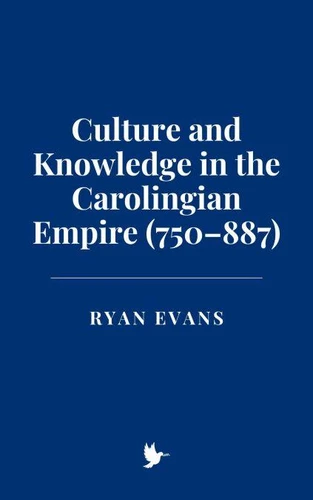Culture and Knowledge in the Carolingian Empire (750–887)
Par :Formats :
Disponible dans votre compte client Decitre ou Furet du Nord dès validation de votre commande. Le format ePub est :
- Compatible avec une lecture sur My Vivlio (smartphone, tablette, ordinateur)
- Compatible avec une lecture sur liseuses Vivlio
- Pour les liseuses autres que Vivlio, vous devez utiliser le logiciel Adobe Digital Edition. Non compatible avec la lecture sur les liseuses Kindle, Remarkable et Sony
 , qui est-ce ?
, qui est-ce ?Notre partenaire de plateforme de lecture numérique où vous retrouverez l'ensemble de vos ebooks gratuitement
Pour en savoir plus sur nos ebooks, consultez notre aide en ligne ici
- FormatePub
- ISBN8230037910
- EAN9798230037910
- Date de parution23/01/2025
- Protection num.pas de protection
- Infos supplémentairesepub
- ÉditeurIndependently Published
Résumé
This book explores the cultural and intellectual revival that occurred during the Carolingian Empire (750-887), known as the Carolingian Renaissance, and its far-reaching impact on medieval European civilization. Through an in-depth analysis of Charlemagne's reign, the book examines the empire's efforts to preserve and transmit classical knowledge, integrate Christian thought with Roman legal traditions, and promote education across both religious and secular spheres.
The text delves into the contributions of key figures such as Alcuin of York, and explores the pivotal role of monasteries and cathedral schools in fostering intellectual life. It also considers Charlemagne's political and legal reforms, including the development of the Capitularies and the creation of a Christianized legal system, and examines the legacy of the empire's cultural achievements in art, architecture, and manuscript illumination.
Despite the empire's fragmentation after Charlemagne's death, the book highlights the enduring influence of the Carolingian Renaissance on the intellectual, religious, and political foundations of medieval Europe. The intellectual frameworks established during this period would go on to shape the medieval universities, scholasticism, and European legal systems, ensuring that the classical and Christian legacies continued to inform Western civilization for centuries.
The text delves into the contributions of key figures such as Alcuin of York, and explores the pivotal role of monasteries and cathedral schools in fostering intellectual life. It also considers Charlemagne's political and legal reforms, including the development of the Capitularies and the creation of a Christianized legal system, and examines the legacy of the empire's cultural achievements in art, architecture, and manuscript illumination.
Despite the empire's fragmentation after Charlemagne's death, the book highlights the enduring influence of the Carolingian Renaissance on the intellectual, religious, and political foundations of medieval Europe. The intellectual frameworks established during this period would go on to shape the medieval universities, scholasticism, and European legal systems, ensuring that the classical and Christian legacies continued to inform Western civilization for centuries.
This book explores the cultural and intellectual revival that occurred during the Carolingian Empire (750-887), known as the Carolingian Renaissance, and its far-reaching impact on medieval European civilization. Through an in-depth analysis of Charlemagne's reign, the book examines the empire's efforts to preserve and transmit classical knowledge, integrate Christian thought with Roman legal traditions, and promote education across both religious and secular spheres.
The text delves into the contributions of key figures such as Alcuin of York, and explores the pivotal role of monasteries and cathedral schools in fostering intellectual life. It also considers Charlemagne's political and legal reforms, including the development of the Capitularies and the creation of a Christianized legal system, and examines the legacy of the empire's cultural achievements in art, architecture, and manuscript illumination.
Despite the empire's fragmentation after Charlemagne's death, the book highlights the enduring influence of the Carolingian Renaissance on the intellectual, religious, and political foundations of medieval Europe. The intellectual frameworks established during this period would go on to shape the medieval universities, scholasticism, and European legal systems, ensuring that the classical and Christian legacies continued to inform Western civilization for centuries.
The text delves into the contributions of key figures such as Alcuin of York, and explores the pivotal role of monasteries and cathedral schools in fostering intellectual life. It also considers Charlemagne's political and legal reforms, including the development of the Capitularies and the creation of a Christianized legal system, and examines the legacy of the empire's cultural achievements in art, architecture, and manuscript illumination.
Despite the empire's fragmentation after Charlemagne's death, the book highlights the enduring influence of the Carolingian Renaissance on the intellectual, religious, and political foundations of medieval Europe. The intellectual frameworks established during this period would go on to shape the medieval universities, scholasticism, and European legal systems, ensuring that the classical and Christian legacies continued to inform Western civilization for centuries.






















